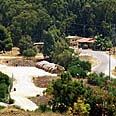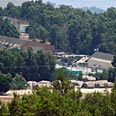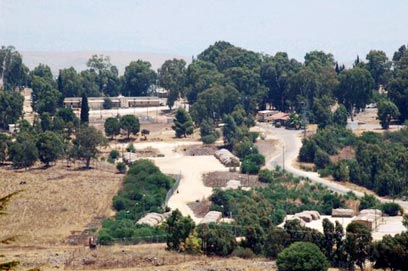
Filon base. Found suited for prison
Photo: Niv Calderon

Construction works started
Photo: Niv Calderon
Preparing for an extended ground operation: The IDF has started constructing a temporary detention center designed to hold the Lebanese prisoners that will be captured during army operations in Southern Lebanon, Ynet has learned recently.
A truck convoy carrying barbed-wire fences, containers, and mobile showers and toilets started unloading equipment at the Filon military base near Rosh Pina Friday, and construction works at the place are already underway. According to plans, the structure should be able to hold up to hundreds of Hizbullah prisoners at any given time.

Filon base. Detention center to be erected on site (Photo: Niv Calderon)
The fact that the army was granted special permission from the Chief Military Rabbinate to continue with construction works throughout Saturday attests to the urgency attributed to the project.
Army sources told Ynet that the decision to build the detention center followed an earlier decision taken this week to call up reserve brigades and launch preparations for a ground offensive deep inside Lebanese territory in the near future.
'Decision to build prison attests to Israel's plans'
According to the officials, the initial plan was to erect the compound near the Koach Junction using an old structure which dates back to the days of the British Mandate and which is currently in use by the Border Guard police. However, as the place is limited in size, the army later decided to locate the new prison at the larger Filon base.
The detention center will be based on the model of previous prisons built in Israel such as Ktziot in the south and the Ofer base in Jerusalem.
During the Lebanon War, thousands of Lebanese detainees were incarcerated at the al-Hiyam prison located in Lebanese territory. Defense officials explained to Ynet that setting up a detention center on such a scale is proof of the Israeli government's plans for an extensive operation that may last for months.
Hanan Greenberg contributed to the report















